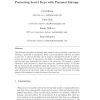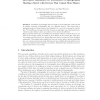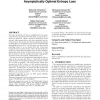24 search results - page 1 / 5 » Protecting secret keys with personal entropy |
FGCS
2000
13 years 4 months ago
2000
Conventional encryption technology often requires users to protect a secret key by selecting a password or passphrase. While a good passphrase will only be known to the user, it a...
ACNS
2010
Springer
13 years 8 months ago
2010
Springer
Secure sketches are useful in extending cryptographic schemes to biometric data since they allow recovery of fuzzy secrets under inevitable noise. In practice, secrets derived from...
CCS
2001
ACM
13 years 9 months ago
2001
ACM
Abstract. We describe a weakness in the High Bandwidth Digital Content Protection (HDCP) scheme which may lead to practical attacks. HDCP is a proposed identity-based cryptosystem ...
PAIRING
2010
Springer
13 years 3 months ago
2010
Springer
Threshold cryptography has been used to secure data and control access by sharing a private cryptographic key over different devices. This means that a minimum number of these dev...
STOC
2010
ACM
13 years 8 months ago
2010
ACM
We study the problem of "privacy amplification": key agreement between two parties who both know a weak secret w, such as a password. (Such a setting is ubiquitous on th...



